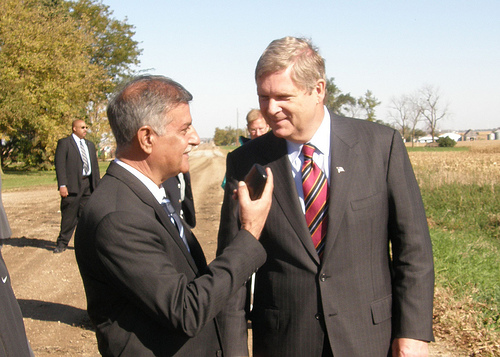Rural America has Plenty to Share with Global Partners

Agriculture Secretary Tom Vilsack accompanied by Pakistani Agriculture Minister Nazar Muhammad Gondal and Afghan Agriculture Minister Mohammad Asif Rahimi during their visit to the Keith and Sue McKinney’s farm in Colo, IA, on Wednesday, October 13, 2010.
The little farming town of Colo sits just east of Ames, Iowa, in the central part of the state. It’s harvest season here. Farm families are trading shifts in their combines to harvest their crops before winter. Rows of soybean and corn stubble disappear into the yellow and brown rolling hills. Folks are hard at work, but some pause and begin to collect at Keith and Sue McKinney’s farm when Agriculture Secretary Tom Vilsack arrives, followed by Pakistani Agriculture Minister Nazar Muhammad Gondal and Afghan Agriculture Minister Mohammad Asif Rahimi. Secretary Vilsack invited Ministers Gondal and Rahimi to be his guests in Des Moines at the World Food Prize, and their meeting all together at the Colo farm was their first since May 2009 in Washington. Still, folks were standing around asking: What does Colo have to do with Afghanistan and Pakistan? But, as Secretary Vilsack, the McKinney family and faculty from Iowa State University explained, Colo could be a model not only for Afghanistan and Pakistan, but developing agricultural economies around the world.
Right after the McKinneys brought out fresh-baked muffins and hot coffee, talk began to focus the big machines in the fields. Afghans and, to some extent, Pakistani farmers still harvest field crops by hand as machinery is expensive and yields and landholdings are not great enough to finance things like tractors and other farm equipment. But the McKinneys wanted to demonstrate the efficiency of modern farm equipment, so to illustrate the point, they invited the Ministers into their corn field to receive a hands-on harvest demonstration. Minister Rahimi climbed aboard a combine and Minister Gondal rode alongside in a tractor. Afterwards, the Ministers commented on the efficiency and speed of the vehicles and began to discuss ways of providing similar vehicles to farming cooperatives in their countries so that they may be shared among tens or hundreds of farmers. This would spread the purchase and maintenance costs and provide greater returns. New farming equipment is a growing need in both nations. In Pakistan, devastating floods recently damaged and destroyed thousands of farming operations.
But modern equipment is just one piece of a vibrant agricultural sector, so much of the farm tour was spent discussing more basic technologies, such as new seed varieties, improved fertilizer and post-harvest storage, and the importance of extension services. At one point in the visit, Secretary Vilsack and the Ministers sat down in an empty grain shed with faculty from Iowa State University’s College of Agriculture and Life Sciences and talked about the important role U.S. land-grant universities play in linking extension services to farmers — a fundamental piece of American agriculture that is missing in both Afghanistan and Pakistan. University president Gregory Geoffroy and Dean of Agriculture Wendy Wintersteen led the discussion, while members of the McKinney family – from 8-year-old kids to grandparents – gave their firsthand account of the importance of extension services. The talk spawned ideas for educational exchanges and linkages with agribusiness.
“What’s unique about U.S. extension,” said Secretary Vilsack, “is that it is led by our universities with government support, rather than the government-led. Our universities are sharing the latest research, the latest technologies, and bringing these to hardworking farmers. And that’s a system we want to share with other nations, such as Afghanistan and Pakistan.”
A main focus of the U.S.-Afghanistan-Pakistan trilateral is sharing agricultural knowledge and techniques, particularly in the areas of plant and animal production, irrigation technologies, and trans-border trading.
Secretary Vilsack and Ministers Rahimi and Gondal will have an open discussion about these issues at 2pm today, and you can watch it live or recorded here .

Agriculture Secretary Tom Vilsack talking to Keith and Sue McKinney about their farming operation, during the Secretary's visit to their farm located in Colo, IA, on Wednesday, October 3, 2010.

Agriculture Secretary Vilsack (right) talks with Pakistani Agriculture Minister Nazar Muhammad Gondal during a visit to the Keith and Sue McKinney farm in Colo, IA, on Wednesday, Oct 13, 2010.
